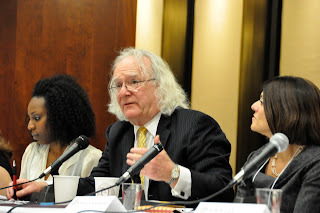 |
| James Hennessy, Ph.D., dean of GSE, discusses how new applicants can navigate the changing education field. Photo by Joanna Klimaski |
For new educators entering the job market, optimism and exuberance often
collide with anxiety and frustration as they meet the realities of the field:
Shrinking budgets, changing school configurations, and steep competition that can
dampen their dreams of running a classroom.
But on March 5, several prominent New York educators offered encouragement to undergraduates,
graduate students, prospective students, and current educators who gathered for a presentation at the Graduate School of Education (GSE).
The panel, “Careers in Education Today: Developing, Updating, and
Promoting Your Skills in Today’s Job Market,” covered topics ranging from improving
one’s marketability to navigating alternative teaching jobs.
Moderated by Linda Horisk,
assistant dean of admissions at GSE, the panel included:
- Abigail Woods Ferreira, career counselor at GSE;
- James Hennessy, Ph.D., dean of GSE;
- Rakeda Leaks, Ed.D., senior director of teacher recruitment and applicant services at the New York City Department of Education;
- John Lee, Ed.D., clinical professor and vice chair of the Educational Leadership, Administration, and Policy (ELAP) division; and
- Marilyn Terranova, Ph.D., superintendent of the Eastchester School District.
The panelists began by chronicling their own circuitous routes into
the education field. While today’s job market may seem to offer few opportunities for
new teachers, the panelists had to walk the same labyrinth of
temporary and nontraditional teaching jobs that many
young educators begin with today.
“They opened themselves up to mobility, whether it was
location—being willing to move to where a job was located—or by taking
alternative paths, not only coming in as a substitute or on a temporary basis,
but working in different fields related to what they were doing,” Horisk said.
Leaks, of the NYC Department of Education, urged participants to
remain open to working in various locales, since many job openings are in
schools in the Bronx, central Brooklyn, the far Rockaways, and other places that
would entail commuting.
She also highlighted several areas with shortages, including
secondary special education, earth sciences, and educators with dual
certifications in English as a Second Language and a particular subject area.
Terranova echoed that need, adding that many districts need
secondary math teachers, foreign language teachers, and people who can teach at
the middle school level.
In addition to working as classroom teachers, participants ought to
consider administrative work, Lee added. Schools have a number of positions in
areas such as professional development, literacy and math coaches, and other
leadership roles.
Besides seeking certification in high-needs areas, participants can
also improve their skills as prospective hires.
“You need to be proficient in using interactive white boards, using
media in your lessons, using these tools to capture the interest and motivation
of students,” Terranova said. “So when you interview, that’s something you
should bring up. We’re always dying to hear about how teachers use technology.”
As for the dreaded paradox of young applicants who answer jobs postings that call for “years of
experience," Lee said to think outside of the box.
“Experience isn’t just a paid job—it’s other things you’ve done,” he
said. “You can have different kinds of experience doing research, organizing
events, volunteering, all of those things. You have to think about what skills
you have.”
The presenters ended on a positive note, urging participants to
persevere despite the challenges of the changing field.
“In New York City for this current school year, we hired almost
5,000 teachers,” Leaks said. “There are definitely opportunities out there, but
you have to be realistic about the hiring landscape, be flexible, and make
yourself as marketable as possible by getting certifications.”
“The requirements for entry into teaching as a field have
strengthened, have been made a little more challenging,” Hennessy added. “The
field is changing, but there are opportunities for people who have the desire,
the intensity, the passion to make a difference.”
— Joanna Klimaski






No comments:
Post a Comment